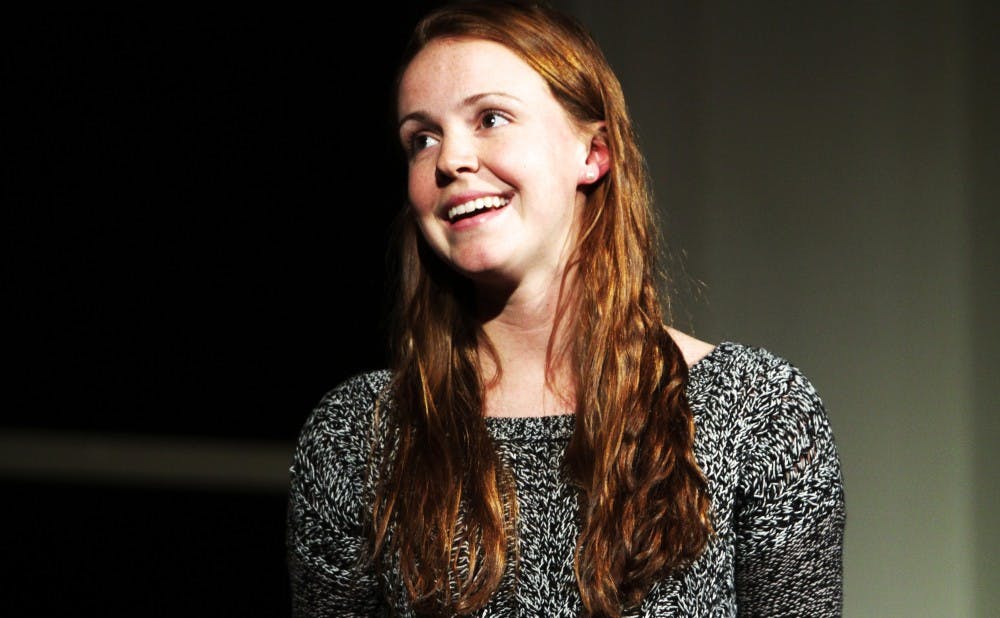She is a character, insofar as she is portrayed onstage by an actor. But she is also a real Duke student who wrote and anonymously submitted a monologue to express something of herself that can’t be shared easily. The power of "Me Too Monologues," which starts its largest-ever run this weekend, derives from the chilling and exhilarating knowledge that the men and women who wrote each monologue could be sitting next to you in the theater, laughing and crying alongside you. It humanizes the burdens, obstacles and successes of 16 different students from different backgrounds in a single evening of highly personal theater.
On a campus where advocacy can be divided across numerous centers and organizations with different focuses, "Me Too" provides a single venue to spotlight issues that cut across the Duke community, said senior Cara Peterson, assistant producer.
“Everyone has their issues and everyone has their struggles, and at 'Me Too' we can come together and be human together and let our masks down,” she said. “You feel like your voice actually matters and you can actually do things.”
When it started six years ago, "Me Too" largely focused on issues of race, but since then it has looked to other forms of identity as well. This year’s show, for instance, features the fairytale story of a farm girl’s journey to the Gothic Wonderland, which turns into a nightmare due to the pursuit of effortless perfection. Another girl has a coming out experience as a Duke student whose family’s poverty leaves her mother stranded between campus and home because she cannot afford another tank of gas. The producers also looked for more white male perspectives this time around.
The diversity of perspectives may help explain how "Me Too" has established itself as not just a play but an event, as seen in the near-messianic response it routinely generates among Duke audiences. Last year’s three performances drew approximately 1,200 viewers, some of whom started lining up at 3 p.m. for a 7 p.m. show, said executive producer Tara Gavcovich, a senior. The line became a social environment of its own as people chatted with each other and ordered food in the hours before the actors took the stage.
“People start talking about the show, talking about the issues involved, and when the actors come they get excited to see people lined up already,” she said.
In order to deal with the crowds, the production team arranged a second weekend of performances, with a week of additional programming in between for viewers to engage with some of the themes raised by the monologues. This will include panels with actors, writers and community leaders on topics including sexuality, gender, racism and engaging in social justice from a position of privilege, Peterson said.
In preparation for the show, each actor was paired with a monologue and began developing a character to tell that story. This could include imagining a childhood for the speaker and figuring out what they studied at Duke, said senior Caroline Kiritsy, one of the actors. There is no guarantee that the monologue will come out exactly how the author expected, but the key is doing justice to their voice.
“I’m very, very honored to be able to be a voice for the person who submitted it,” Kiritsy said. “It is so humbling that they’ve allowed somebody to tell their story for them...It’s all anonymously submitted, so the person could be the one that I’m making eye contact with the entire time that I’m saying it.”
Actor Elizabeth Hoyler, a sophomore, noted that although she could not directly relate to the situation portrayed in her monologue, she was able to pull out emotional strains that resonated with her experience. This works for the audience members too—the show invites viewers to find moments of shared experience in unlikely places.
“I believe in a lot of what this show is trying to do—showing vulnerability at Duke, showing what’s below the surface,” Hoyler said. “A lot of times Duke students project an image that ends up perpetuating our loneliness because we don’t see other people are struggling like we are. I just wanted to be part of a project that helps empower and at the same time humble students.”
"Me Too Monologues" opens tonight, January 30, and will run on January 31 and February 1, 7 and 8. Shows are in the Nelson Music Room and will start at 7:30 p.m. Doors open at 7:00 p.m. Audience members are recommended to arrive early to guarantee seating. For more information, visit the Facebook event.
Get The Chronicle straight to your inbox
Signup for our weekly newsletter. Cancel at any time.

